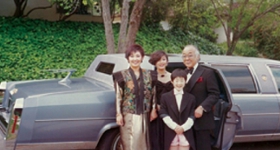What with mixed reports about the film from various Asian American blogs, plus having already been wary over recent Hollywood remakes of movies with Asian characters or Asian themes, I dismissed The Karate Kid as another Hollywood rehash I'd avoid financially supporting and stayed away from the film's opening weekend. However, I became intrigued when people familiar with my stance (cynical) toward Hollywood remakes of Asian-related films assured me the film wasn't what I assumed. I guardedly checked it out for myself, and to my own surprise, enjoyed it. Jaden Smith is just as charismatic as his father (if not more), and Jackie Chan shows off some dramatic acting chops that some probably didn’t even know he had.
I was a huge fan of the original. I’ve seen it enough to the point where I know much of the dialogue and scenes by heart. I like the remake even more. There are enough reviews of the film out there now that so there is no need to do another here. To read some reviews about the remake, click here for an amusing Disgrasian (warning - filled with spoilers) recap of the film itself, and here for 8Asians' take on why they enjoyed the film. Here I’d like to provide some counterpoint to some recent online commentary, as well as put this film into context relative to other films and media issues.
One could argue that the Karate Kid remake goes back to some of the original roots of American cinematic martial arts. Bruce Lee was one of the first, if not the first, entertainers to have black protagonists in his films, with characters that didn't ask the actor to have to play some sort of ridiculous caricature or demeaning or subservient archetype. For many Black Americans, it was the first time they saw a strong, powerful, positive black image in American entertainment. Jeff Yang writes here that Blacks were instrumental in promoting martial arts in America. Black Americans have consistently been avid supporters and fans of Asian martial arts and films, long before white America ever caught on. Martial arts were found in many of the Blaxploitation films of the 1970’s, but the past 40 years of American cinema have been more of a white appropriation of martial arts culture, without including significant black actors despite strong support from that community, through martial artists like Chuck Norris, Steven Seagal, and Jean Claude Van Damme. What has happened to martial arts is similar to how jazz, blues (precursor to rock n’ roll), soul, and hip hop were co-opted and appropriated (in varying degrees and over decades), from black originators, into white American culture. Though I enjoyed the original Karate Kid, one could argue that it contributed greatly to the appropriation of martial arts by white suburban America.
I was a huge fan of the original. I’ve seen it to the point where I know much of the dialogue and scenes by heart. I like the remake even more. There are enough reviews of the film out there now that you don't need another. See Disgrasian for an amusing recap (warning -- filled with spoilers), or 8Asians for a positive review. Here I’d like to provide some counterpoint to some recent online commentary, as well as put this film into context relative to other films and media issues.
One could argue that the Karate Kid remake goes back to some of the original roots of American cinematic martial arts. Bruce Lee was one of the first, if not the first, entertainers to have black protagonists in his films, with characters that didn't ask the actor to have to play some sort of ridiculous caricature or demeaning or subservient archetype. For many Black Americans, it was the first time they saw a strong, powerful, positive black image in American entertainment. Jeff Yang writes here that Blacks were instrumental in promoting martial arts in America. Black Americans have consistently been avid supporters and fans of Asian martial arts and films, long before white America ever caught on. Martial arts were found in many of the Blaxploitation films of the 1970’s, but the past 40 years of American cinema have been more of a white appropriation of martial arts culture, without including significant black actors despite strong support from that community, through martial artists like Chuck Norris, Steven Seagal, and Jean Claude Van Damme. What has happened to martial arts is similar to how jazz, blues (precursor to rock n’ roll), soul, and hip hop were co-opted and appropriated (in varying degrees and over decades), from black originators, into white American culture. Though I enjoyed the original Karate Kid, one could argue that it contributed greatly to the appropriation of martial arts by white suburban America.
Some critics point to Will Smith's possible motivations as driven by nepotism, to revive the Karate Kid franchise for his own son. While this may or may not have been a factor behind his decision to produce the movie, I wonder how many Asian Americans realize that Will Smith helped fund/produce Saving Face a few years ago, a well-made progressive Asian American film (and one of my favorites). He also starred in I Am Legend, a film based on a fictional white protagonist.
It seems to me that some of the biggest opponents of the Karate Kid remake are white commentators who don’t like it precisely because it writes out the white protagonist and the white Cobra Kai characters (which developed a cult following from the movie) -- characters they identified with and remembered fondly while growing up. If that's the case, I think this remake serves as a nice foil for white America possibly to empathize more with why Asian Americans have been so angry over the likes of Dragonball, Speed Racer, The Last Airbender, and an upcoming Akira remake.









Comments
Michael Jai White is an avid martial artist but is hardly a 'popular performer' or a movie star; he plays one-episode TV guest roles and barely has a career. Billy Blanks created the Tae Bo aerobics workout. These are hardly popular or well known movie or TV stars. Norris, Seagal, Van Damme aren't the greatest actors but were/are given broad exposure in film and television. Your weak examples actually prove my point. The Jeff Yang article did a good job covering how American martial arts were really originally embraced and promoted by Black Americans, if you take the time to read it. Also, The Last Airbender is an American-created television program, not a Japanese program, and none of the characters have blond hair or blue eyes. In fact, they are clearly based on East Asian and Inuit people and cultures.